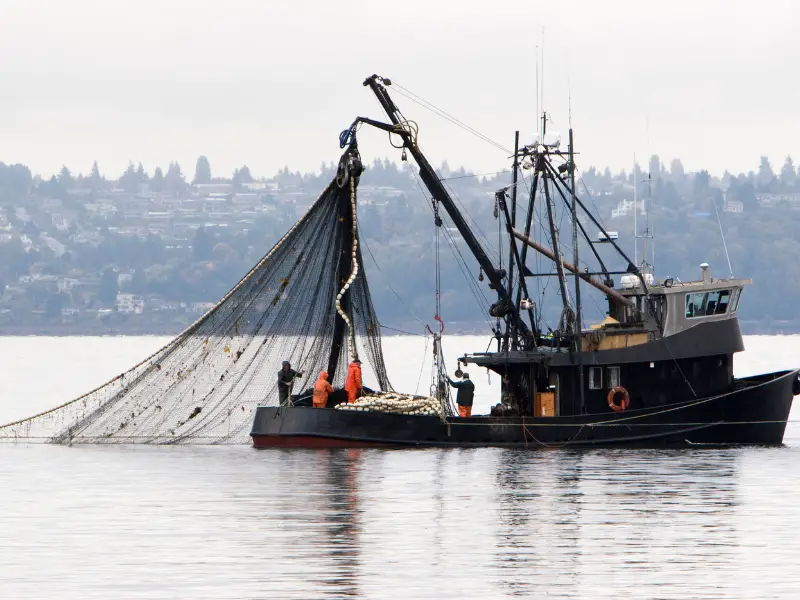The commercial fishing industry is one of the world’s rising industries, with global profits of over $250 billion a year. It is expected to continue growing despite the tough economy in recent years, even more so now because of the coronavirus pandemic.
A lot of people ask themselves, is starting a commercial fishing business even profitable? If so, how can you start such a business in 2024?
Before you start catching fish, you need licenses from your local authorities. Next, you need buyers before you start getting the product. You’ll also need a boat and a crew, experienced on a fishing boat because it’s a job that’s learned only by an on-hand approach.
It sounds easier than it is, though. Sailors and fishers endure some of the most challenging working conditions in the world. Imagine getting caught in a thunderstorm on a boat in the middle of the ocean at night. It sounds like a horror movie, right?
Well, it’s everyday life for commercial fishers, so you better be ready to endure the hardest moments if you ever wish to make a profit. Here’s everything you need to know about starting a commercial fishing business in 2024.
Is commercial fishing profitable?

You might like fishing and think it would be fun to turn it into a full-time job. That might be true, but it’s far from easy.
First, you must be certain that it’s even profitable for you to invest in such a business because it is a significant investment. But, if you can do it right, there’s a big profit you can make. Let’s break down the numbers.
How much money is the commercial fishing industry worth?
According to research and forecast of the Global Commercial Fishing Industry market, the overall growth of global commercial fishing will rise from around $240 billion in 2017 to $440 billion in 2026. We can expect that prediction to be slightly off due to the worldwide pandemic, as all economies are expected to suffer consequences.
But it’s a clear indicator that it is worth giving a shot. There’s a profit to be made, and if you can withstand what it takes, then you should go for it, especially if you’re already an experienced fisherman.
We have to note that the mentioned statistic is an average taken from the entire world. When having a deeper look at it, it’s evident that some areas of the world have more product outputs than others, but that doesn’t necessarily mean it’s more profitable to fish there – it means there’s more competition.
For instance, China is the world’s number one country for fishing output and has a larger harvest volume than the following twelve countries combined. However, they are nowhere near the top when it comes to fishermen’s salaries per capita.
What we are saying is, no matter where you are, you have to explore the market to determine if it’s profitable for you to start. Check to see how much an average fisherman earns per year before even thinking about how much the above-the-average ones make.
How much money does a commercial fisherman make a year?
Just like with the global commercial fishing industry numbers are an overall average, the overall average salary doesn’t paint a precise picture of how much a fisherman regularly earns on the job. It will also depend on what area of the world you’re located in, so we’ll pull some statistics for USA-based fishers.
An average salary of a commercial fisherman in the US is roughly around $60 000 a year. However, the gap between those who make the most and the ones that make the least is quite big. The highest-paid group can earn over $140 000 a year, while the bottom-level fishermen get just over $20 000.
That means most of them get between $30 000 and $40 000 per year. It’s not bad money, but to endure everything you have to, doing such physically exhaustive labor all the time should be worth a lot more than that. Weigh your options, ask around to see how much commercial fishers around your area earn, and see if it satisfies your needs and expectations.
One other thing about the salary is the way that commercial fishers usually get paid. It’s not really a consistent salary, as the catch is not always the same. We’ll get into that a bit more later.
How do commercial fishermen get paid?
There’s a big salary gap between being an owner and captain of a commercial fishing business and being one of the crew members. You will earn considerably more as a captain, but your salary will fluctuate just like it does for all other members of your crew. The reason behind it is that you usually get paid by crew share.
Crew share is a percentage system that every crew member gets, from the deck maintenance crew to technicians and fishers. The more fish you catch, the higher the crew share is for everybody.
That means you can have a terrific season and have a considerable profit and then earn only a fraction of that next year. It all depends on how much maintenance cost and how much you caught. It also depends on how much you can sell, especially if you’re the owner.
Ensure you have orders in place before going fishing. That way, you can guarantee a fresh product, and you can always sell what’s left frozen. The more you sell, the closer you get to that top-earning group of commercial fishermen, making over $140 000 a year.
How to start a commercial fishing business?

As with any other business, there are steps to open a new business officially. It requires some bureaucracy first, and only when everything is set can you set sail and go fishing. We’ll make a step-by-step guide for you to follow to make it easier for you if you decided to start.
1. Get the proper licenses and regulations in order
The boring part comes first. It involves a lot of paperwork and walking around from office to office, but trust me – it’s better to get it sorted out before than to have to pay fines later. It’s a lot more expensive, and it makes it even harder to get a license at all.
First, visit your local authorities to figure out who to talk to about getting a commercial fishing license.
Every area has a unique set of rules and restrictions when it comes to starting a commercial business. Also, you need to satisfy requirements such as having at least one technician onboard, at least two vessel operators, etc.
You will find out what needs to be in place when you get there. Once you get that settled, you need to apply for a license to fish and start a company. Only when you settle on every paper you need can you start thinking about other stuff.
2. Get a boat ready to set sail
You’ll need a fishing boat to even think about commercial fishing. You can always rent one, but if you are serious about growing a business, you’re better off owning your boat. When you get everything in place, you need to register it, as you would any other vehicle.
It needs to function impeccably, so make sure to make all the repairs before setting sail. Safety always comes first. Fill it with fuel and keep receive tanks on board in case of an emergency.
When you’re all set, find out where you will fish. There are restrictions on both what your boat can handle and where you have the license to fish provided by the authorities.
3. Get buyer contracts
You don’t just go out there, get a ton of fish and expect people to come asking for it. Selling the product and competing with big corporation prices is almost as hard as the fishing itself, so you better have some buyers on a contract before setting sail.
It’s risky if you don’t catch as much as you thought, but that’s why you sign a contract. Work out the details with the buyer, and find solutions that keep you secured financially and keep them happy to continue buying. A faithful small customer is more worth it to you than a big one you can’t count on.
4. Hire a crew
We mentioned there might be some requirements regarding your crew. Hire as many people as you think will be necessary for your boat to function efficiently.
Just make sure to fulfill all the duties assigned by the authorities, e.g., a technician, a safety administrator, etc. One crew member can have multiple functions if they are trained to do so.
It is advisable to have more than one vessel operator on board in case of an emergency. You’ll also need maintenance and experienced fishers who can handle the roughest conditions.
5. Catch the product you are familiar with
It’s nice to experiment with catching other things than what you’re comfortable with, such as crabs, squids, clams, etc. You should always stick to your guns first.
If you know the area where a particular fish inhabits, and you know how to catch it, it’s better to play to your strengths before exploring further.
You can make a significant profit by having various products, but it also means more paperwork and licenses. You also risk not catching anything, which is probably even worse.